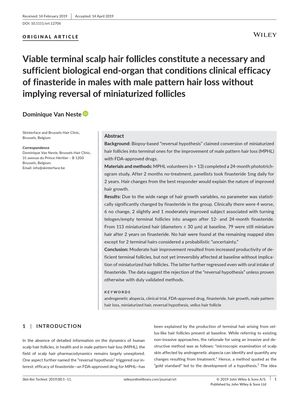Viable Terminal Scalp Hair Follicles Are Necessary and Sufficient for Clinical Efficacy of Finasteride in Male Pattern Hair Loss
June 2019
in “
Skin Research and Technology
”

TLDR Finasteride works for hair loss by maintaining existing hair follicles, not reversing miniaturization.
This study investigated the effectiveness of finasteride in treating male pattern hair loss (MPHL) and found that viable terminal scalp hair follicles are necessary for the clinical efficacy of the drug. The study challenges the "reversal hypothesis" and suggests that the drug's efficacy is due to its ability to maintain the viability of existing hair follicles rather than reversing miniaturization. The study involved 14 male subjects who were monitored for 24 months while taking finasteride. The study concludes that viable terminal scalp hair follicles are necessary and sufficient for the clinical efficacy of finasteride in males with MPHL.
















